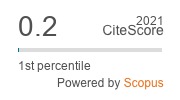Review of Counter-Based Digester Ack's Effectiveness in Manet Packet Loss Prevention
Abstract
A wireless peer-to-peer network with a mobile component adaptability and self-formation characteristics that lacks infrastructure. The network is ideal for use in emergency and disaster assistance applications that need reliable communication.. Finding the channel between communicative entities and sending information across it enables communication. There are several routing protocols in the literature that are developed to achieve reliable communication. Routing protocols are susceptible to packet losses because they consider network nodes to be receptive to communication. Due to malicious behavior or a shortage of resources, nodes trash packets. To address the problem, a number of intrusion detection systems have been suggested in the literature. In order to prevent packet losses in MANET, the newly created counter-based digested Acknowledgement (CDACK) was developed. This study's objective is to assess the CDACK protocol's performance in relation to current MANET intrusion detection systems. The findings demonstrate that, in terms of avoiding packet dropping nodes from the routing path, the CDACK protocol is a good fit for MANET..




